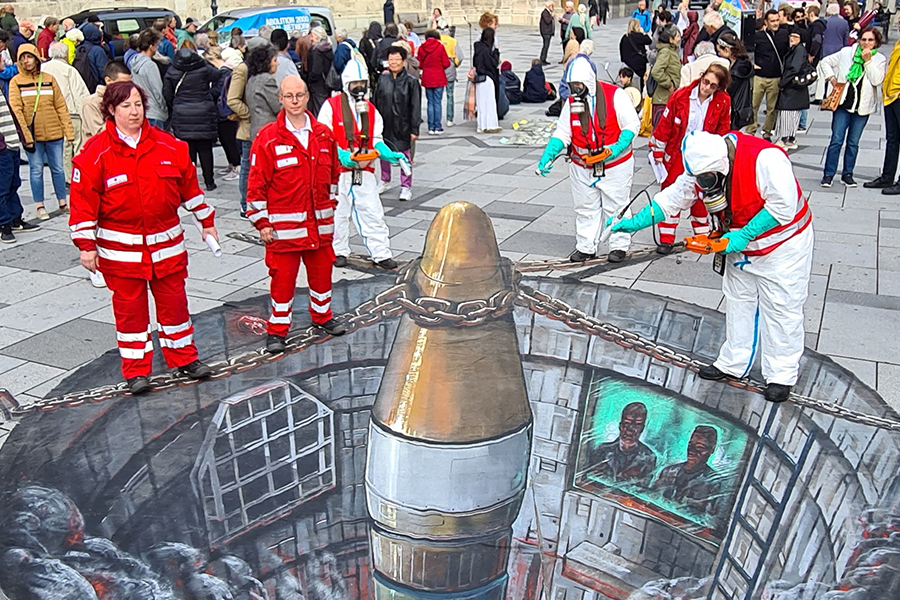MPI Event Report
by Matt Werner
United Nations, New York
November 4, 2004
United Nations, New York – On November 4, 2004, the Middle Powers Initiative (MPI) hosted a forum at the United Nations entitled, “New Implications for the NPT 2005 Review.” The distinguished panel included the Right Honourable Kim Campbell, Former Prime Minister of Canada; Ambassador Robert Grey, Jr., Former U.S. Representative to the Conference on Disarmament, Geneva; and John Holum, Former U.S. Undersecretary of State for Arms Control and National Security.

Ms. Campbell served as the Panel Chair while Mr. Holum and Amb. Grey offered their views on how the U.S. election outcome would affect the Nuclear Non-Proliferation Treaty (NPT) Review in May of 2005.
MPI convened this forum with the goal of stimulating discussion regarding the current political realities surrounding the NPT review process. Two diverging strategies were addressed, specifically whether countries should assume a hard-line approach to the review or whether a moderate approach would be more reasonable and unifying.
In addition to its proximity to the U.S. elections, the timing of this event was significant in another respect. A week prior, the First Committee of the UN voted on the New Agenda Coalition (NAC) Resolution. The final vote was 135-5-25, which was a considerable gain over the NAC Omnibus resolution of 2003, which was 121-6-38. The most notable shift was the move by seven NATO states to join Canada in voting for the NAC resolution. The eight NATO states now endorsing the resolution include Belgium, Canada, Germany, Luxembourg, Lithuania, the Netherlands, Norway, and Turkey. (For further analysis click here)
Following an introduction by Sen. Douglas Roche, O.C., Chair of MPI, Ms. Campbell opened the session by explaining that the elections in major countries are not just domestic affairs but can have significant international implications. She also emphasized the point made by both President Bush and Senator Kerry that nuclear weapons proliferation is the most serious issue of our time.
Amb. Grey expressed his view that in the next four years, international institutions will be stressed to an even greater extent and international order will be further challenged under the second Bush administration.
With respect to the NPT 2005 Review, Amb. Grey stressed that countries should continue to take moderate steps in helping move the NPT agenda forward. He warned that it would be a mistake for countries to jeopardize the NPT by pushing for dramatic or idealistic utopian goals. Rather, countries should work towards bolstering support for the New Agenda Resolution, which he believes is a very reasonable position.
In addition, Grey suggested that the NPT could be at risk if the U.S. is allowed to insert empty rhetoric into the review process. He said this would allow the administration a free pass to rationalize unacceptable behavior. He emphasized that countries need to work together to help build an international consensus.
Mr. Holum indicated that we should expect the same path over the next four years under a second Bush administration. He warned that the fate of the arms control regimes in the next four years will depend on the moderate Republicans in the Senate (including Lugar, Hagel, Warner and others). Furthermore, he suggested that part of the arms control strategy going forward should be to concentrate on what these key players can do to influence U.S. policy.
Not envisioning much progress on the 13 Practical Steps over the next four years, Mr. Holum suggested focusing on ways of preventing the administration from causing further harm to the existing arms control regimes. He believes that treaties such as the NPT, Anti-Ballistic Missile Treaty (ABM), Outer Space Treaty and others, are durable because they are in the interest of all countries, including the U.S., and we must do what we can to preserve them.
Offering closing remarks, Jonathan Granoff, President of the Global Security Institute, stated that the principles of irreversibility, verifiability, and transparency are the keys to the NPT’s future survival. Regardless of the outcome of the U.S. election, he warned that it would be a mistake to allow the U.S. to ignore their NPT commitments. Echoing the sentiments of Amb. Grey, Mr. Granoff further emphasized the point that the New Agenda must be strengthened. He believes that international efforts must be focused upon strengthening the rule of law and bolstering collective security efforts.
The forum also included a question and answer session between the panel and the participants, which included ambassadors, delegates, and political counselors from over 20 countries – including Germany, Japan, Canada, Australia, Brazil, New Zealand, Poland, Mexico, Switzerland, and Ireland.
Ms. Campbell closed the session by expressing her sincere gratitude for the work of every nation towards strengthening the NPT regime.







